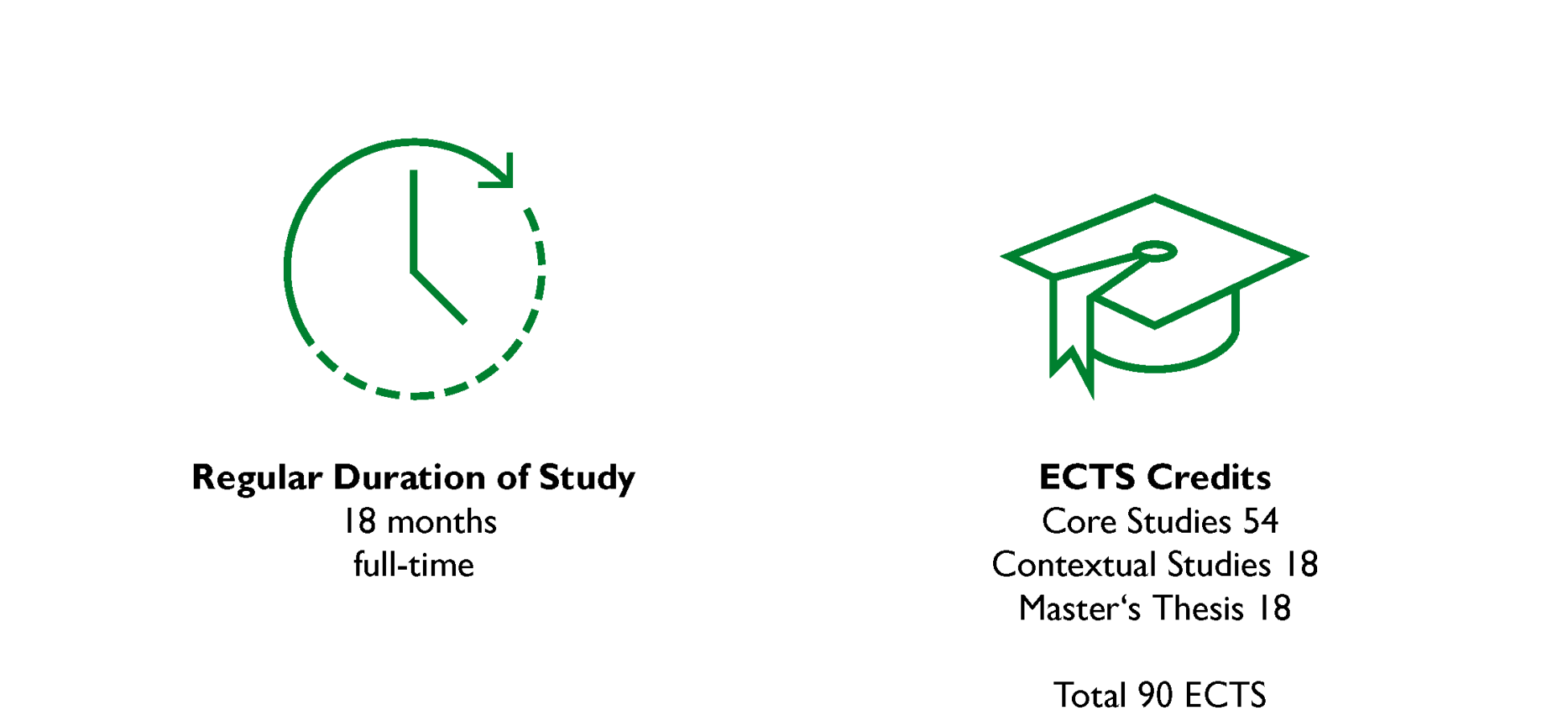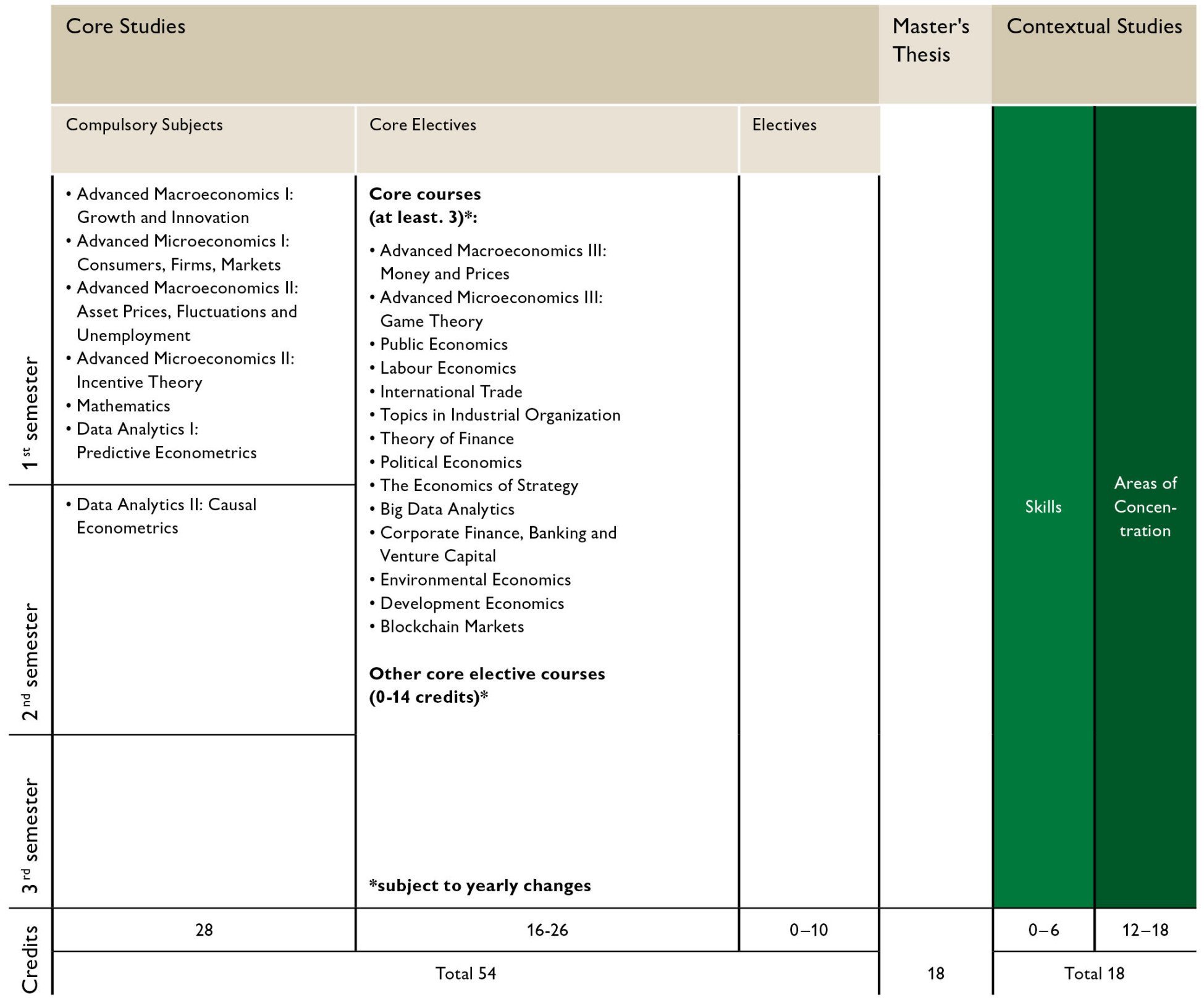
Throughout the entire MEcon programme, you will be equipped with the necessary tools for careers in economics and research in the digital age. At the University of St.Gallen (HSG), the integration of functional knowledge for the major economic and social challenges of our time is at the center of all thought and action.


MEcon prepares you for responsible positions in the economic environment. Whether from the perspective of Economists, Start-Up Founders, Consultants or a Bank. MEcon graduates develop five core competencies as part of their studies.
Our compulsory area covers the central topics of Micro- and Macroeconomics, Data Analytics and Mathematics.
In the context of economic challenges, topics such as the major economic and social challenges of our time require a holistic understanding of the economy as a whole.
The Core Elective area covers the breadth of Economics by choosing at least three courses (12 - 26 ECTS), while the rest of the Electives area completes the offer. While the other Core Electives pillar trains students' specialist skills in the field of economics, the Contextual Studies focuses on the development of social and cultural skills.
Furthermore, additional qualifications such as «FinTech», «Business Education», «Digital Communication and Journalism» and «Managing Climate Solutions» are offered.

Your core studies consist of compulsory area and the core electives area. The compulsory courses provide you with a distinct profile. Within two semesters, you will gain a unique academic education in the core disciplines of economics with a total of 28 ECTS credits. Additionally, you will acquire valuable insights into current economic issues and learn how to handle large datasets.
The compulsory area comprises a total of seven courses: four in the core disciplines of micro- and macroeconomics and three in the methdological area.
| Course | ECTS | Semester |
| 7,250 Advanced Macroeconomics I: Growth and Innovation | 4 | Autumn |
| 7,252 Advanced Microeconomics I: Consumer, Firms, Markets | 4 | Autumn |
| 7,254 Advanced Macroeconomics II: Asset Prices, Fluctuations and Unemployment | 4 | Autumn |
| 7,256 Advanced Microeconomics II: Incentive Theory | 4 | Autumn |
| 7,300 Mathematics | 4 | Autumn |
| 7,310 Data Analytics I: Predictive Econometrics | 4 | Autumn |
| 8,300 Data Analytics II: Causal Econometrics | 4 | Spring |
You can find the entire course offering and the course factsheets in the official Course Catalogue Online.
Building on the solid foundation of the compulsory courses, the Core Elective pillar (16 - 26 ECTS credits) allows you to further define your academic profile, deepen your individual interests, and broaden your economic perspectives.
In the MEcon programme at the University of St.Gallen, we offer courses with an Economics focus both within the Core Elective Area and the broader Elective Area. In the Elective Area, you have the opportunity to attend courses from different thematic fields.
The core courses enable students to deepen and broaden their knowledge in the core disciplines of the compulsory area and/or combine it with other courses. MEcon students must take at least three core courses totalling 16 ECTS credits.
| Core Courses | ECTS | Semester |
| 7,260 Topics in Industrial Organization | 4 | Autumn |
| 7,315 Theory of Finance | 4 | Autumn |
| 9,268 Political Economics | 4 | Autumn |
| 9,272 Big Data Analytics | 4 | Autumn |
| 8,252 Advanced Macroeconomics III: Money and Banking | 4 | Spring |
| 8.253 Urban Economics | 4 | Spring |
| 8,256 The Economics of Strategy | 4 | Spring |
| 8,260 Public Policy, Taxation and Inequality | 4 | Spring |
| 8,264 International Trade in a Fragmenting World | 4 | Spring |
| 8,274 Corporate Finance, Banking and Venture Capital | 4 | Spring |
| 8,275 Economics in Healthcare | 4 | Spring |
| 8,276 Environmental Economics | 4 | Spring |
| 8,288 Blockchain Markets | 4 | Spring |
| Other Core Electives | ||
| 7,264 Database Systems for Business Analytics | 4 | Autumn |
| 7,305 Statistics | 4 | Autumn |
| 7,320 Quantitative Risk Management | 4 | Autumn |
| 7,322 Quantitative Asset Management | 4 | Autumn |
| 7,368 Introduction to Cryptography and Cybersecurity | 4 | Autumn |
| 7,377 Multilateral Development Banks: Mandates, Projects, Challenges | 4 | Autumn |
| 7,395 Consultancy Project: Energy in Transition - Challenges and Opportunities in the Gulf Region | 4 | Autumn |
| 7,396 Consultancy Project: Economic Crisis and Crisis Management | 4 | Autumn |
| 9,168 Theory of Risk and Insurance | 4 | Autumn |
| 9,264 Recent long-run Macroeconomic Trends | 4 | Autumn |
| 9,332 Advanced Econometric Methods | 4 | Autumn |
| 9,334 Quantitative Behavioral Finance | 4 | Autumn |
| 8,152 Derivatives | 4 | Spring |
| 8,154 Financial Econometrics | 4 | Spring |
| 8,174 Applied Quantitative Asset Management | 4 | Spring |
| 8,194 Derivatives Modeling in Python | 4 | Spring |
| 8,254 Organizational Economics | 4 | Spring |
| 8,266 Economics of Central Banking | 4 | Spring |
| 8,270 International Macroeconomics (MEcon) | 4 | Spring |
| 8,273 Advanced Tools in Data Analytics | 4 | Spring |
| 8,280 Beyond Homo Oeconomicus: Decision Making and Wellbeing in Economics | 4 | Spring |
| 8,282 Asset-Liability Management für Schweizer Pensionskassen | 4 | Spring |
| 8,310 Asset Pricing | 4 | Spring |
| 8,312 Microeconometriccs | 4 | Spring |
| 8,314 Time Series Econometrics | 4 | Spring |
| 8,316 From Data to Decisions: Dynamic Choice under Uncertainty | 4 | Spring |
| 8,318 Financial Volatility | 4 | Spring |
| 8,320 AI for Decision Making | 4 | Spring |
| 8,330 Machine Learning (MiQE/F) | 4 | Spring |
You can find the entire course offering and the course factsheets in the official Course Catalogue Online.
Would you like to sharpen your academic profile to better communicate it to future employers? In the MEcon programme, you have the option to choose an additional, certificate-relevant specialisation, which will be noted on your final degree.
The specialisation tracks are tailored to meet diverse students interests and further enhance your employability. You can specialise in one of the following areas:
To graduate the MEcon with one of the above specialisations, you must complete at least 16 ECTS credits from a defined course list and write your Master's Thesis in the corresponding subject area.
You can find the entire course offering and the course factsheets in the official Course Catalogue Online.
Many of our MEcon students choose to spend their third semester at one of our partner universities all over the world. While studying abroad, they can transfer up to 18 ECTS credits, and more importantly, acquire intercultural competencies without having to interrupt their studies.
Additionally, students have the opportunity to pursue a double degree through the prestigious CEMS programme. Selected students can earn two Master’s degrees in a short period of time, giving them a competitive advantage in the global job market. CEMS is ranked among the top programmes globally, consistently holding 9th place in the Financial Times worldwide rankings. It is essential to review the application criteria, particularly the language requirements, beforehand.
There is also the possibility of enhancing your knowledge and perspective with a double degree with ESADE, RSM, HEC or SSE. Double degree students can take advantage of unique degree combinations and the possibility for in-depth study within different cultural contexts. At the conclusion of the double degree programme, usually 2.5 years, students will earn two full Master degrees, a HSG MA degree and a second Master from the partner university. Graduates enjoy the very best career opportunities and close ties to both the HSG and their host university.
The MEcon is distinguished by its international focus. Students complete the compulsory courses in English, and in the core electives, electives, and context studies, they can choose courses in both German and English. Our graduates are well-prepared for careers in German- and English-speaking companies and international organisations.
Here you will find a summary of the most important legal provisions in the Master’s degree programme.
Innovation and globalization create new opportunities, but also threaten jobs and earnings of others. Inequality gets larger. Ageing challenges pension and health systems. Climate change threatens the quality of life. Education and public infrastructure must catch up to support new technologies, and governments must rethink their role in the economy. What is required more than ever are public policies based on sound theory and empirical evidence.
Typical jobs requiring a public policy expertize are in government institutions, OECD, industry organizations, labour unions or independent think tanks. Research institutes specialized in public sector economics, social security, or related fields are key employers (e.g. Institute of Fiscal Studies in London, KOF in Zürich, Ifo in Munich, ZEW in Mannheim, IZA Institute of Labor Economics in Bonn, etc.).
In order to graduate as a Master in Economics with a declared specialisation in Public Policy, you need to gain at least 16 ECTS from the courses listed below and write your Master's Thesis in the area of Public Policy.
| Course | ECTS | Semester |
| 9,266 Globalisation and the Environment | 4 | Autumn |
| 9,268 Political Economics | 4 | Autumn |
| 9,272 Economics of Central Banking | 4 | Autumn |
| 8,250 Algorithmic Game Theory | 4 | Spring |
| 8,252 Advanced Macroeconomic Theory III: Money and Prices | 4 | Spring |
| 8,253 Urban Economics | 4 | Spring |
| 8,260 Public Policy, Taxation and Inequality | 4 | Spring |
| 8,262 Labor Economics | 4 | Spring |
| 8,275 Economics in Healthcare | 4 | Spring |
| 8,278 Environmental Economics | 4 | Spring |
| 8,280 Beyond Homo Oeconomicus: Decision making and Wellbeing in Economics | 4 | Spring |
You can find out how to structure your studies in the specialisation Public Policy here
Note: This course offering corresponds to the current planning status. You can find the entire course offering and the course factsheets in the official Course Catalogue Online.
Innovative firms go global and grow large. Consumers import what foreigners do better. Investment and jobs flow from declining to growing sectors, in which productivity is high and perspectives for jobs and wages are better. Specialization and trade help to become rich by focusing on what a country can do best. However, trade and innovation can also lead to inequality. How can we share the gains from trade widely?
Ambitious students aim for a job with reputable international organizations such as IMF, World Bank and WTO which source new talent from many good universities and require strong skills in theory and evidence based policy analysis. Economic research institutes (KOF, Ifo, DIW, ZEW etc.) are also on the agenda. Many alumni go to private sector firms and domestic policy institutions, who value their analytical and quantitative skills.
In order to graduate as a Master in Economics with a declared specialisation in Global Economy, you need to gain at least 16 ECTS from the courses listed below and write your Master's Thesis in the area of Global Economy.
| Course | ECTS | Semester |
| 9,264 Recent long-run Macroeconomic Trends | 4 | Autumn |
| 9,266 Globalisation and the Environment | 4 | Autumn |
| 9,268 Political Economics | 4 | Autumn |
| 8,250 Algorithmic Game Theory | 4 | Spring |
| 8,252 Advanced Macroeconomic III: Money and Prices | 4 | Spring |
| 8,253 Urban Economics | 4 | Spring |
| 8,260 Public Policy, Taxation and Inequality | 4 | Spring |
| 8,264 International Trade in a Fragmenting World | 4 | Spring |
| 8,270 International Macroeconomics (MEcon) | 4 | Spring |
You can find out how to structure your studies in the specialisation Global Economy here
Note: This course offering corresponds to the current planning status. You can find the entire course offering and the course factsheets in the official Course Catalogue Online.
Managers and entrepreneurs can make a real difference if their incentives are right. Boards must design executive compensation and provide oversight and control. Personnel economics informs successful hiring and human resources development. Corporate finance analyses the best use of capital within and across firms. To stay ahead of rivals, firms need not only R&D but also clever strategic decision-making informed by game theory.
Many MEcon alumni accept challenging jobs in consulting and in various management positions. Leading consulting firms are highly interested in well-trained economists who combine strong quantitative skills with good intuition and clever strategic thinking. A specialization in managerial economics also prepares for jobs offered by policy institutions such as competition authorities, industry organizations, government agen-cies dealing with innovation, digitization and other business related programs.
In order to graduate as a Master in Economics with a declared specialisation in Business Economics, you need to gain at least 16 ECTS from the courses listed below and write your Master's Thesis in the area of Business Economics.
| Course | ECTS | Semester |
| 7,260 Topics in Industrial Organisation | 4 | Autumn |
| 9,334 Quantitative Behavioral Finance | 4 | Autumn |
| X,XXX Personnel Economics | 4 | Autumn |
| 8,250 Algorithmic Game Theory | 4 | Spring |
| 8,254 Organizational Economics | 4 | Spring |
| 8,256 The Economics of Strategy | 4 | Spring |
| 8,274 Corporate Finance, Banking and Venture Capital | 4 | Spring |
| 8,280 Beyond Homo Oeconomicus: Decision Making and Wellbeing in Economics | 4 | Spring |
| 8,288 Blockchain Markets | 4 | Spring |
You can find out how to structure your studies in the specialisation Business Economics here
Note: This course offering corresponds to the current planning status. You can find the entire course offering and the course factsheets in the official Course Catalogue Online.
Households borrow to buy homes and choose portfolios to achieve the preferred trade-off between risk and return in savings. Firms need to raise equity and to draw on a credit to finance investment. Governments issue public debt. Insurance and pension funds diversify risks and invest to finance retirement income. When there is a financial crisis, the economy is in real trouble. Banking and capital market regulation must reduce individual and macroeco-nomic risk, thereby creating stability.
MEcon alumni often pick up jobs in banking and wealth management companies. Some join the insurance industry and others accept job offers by central banks such as the SNB or the ECB in Frankfurt. Analyst positions in big banks as well as treasury positions in large multinational firms are another opportunity. Finally, international organizations such as the IMF or from government and regulatory institutions (FINMA, BIS in Basel, the European ESM etc.) also offers jobs for graduates with a sound training in economics and finance.
In order to graduate as a Master in Economics with a declared specialisation in Financial Economics, you need to gain at least 16 ECTS from the courses listed below and write your Master's Thesis in the area of Financial Economics.
| Course | ECTS | Semester |
| 7,315 Theory of Finance | 4 | Autumn |
| 7,320 Quantitative Risk Management | 4 | Autumn |
| 7,322 Quantitative Asset Management | 4 | Autumn |
| 9,334 Quantitative Behavioural Finance | 4 | Autumn |
| 8,252 Advanced Macroeconomics III: Money and Prices | 4 | Spring |
| 8,274 Corporate Finance, Banking and Venture Capital | 4 | Spring |
| 8,288 Blockchain Markets | 4 | Spring |
| 8,310 Asset Pricing | 4 | Spring |
| 8,318 Financial Volatility | 4 | Spring |
| 9,272 Economics of Central Banking | 4 | Spring |
You can find out how to structure your studies in the specialisation Financial Economics here
Note: This course offering corresponds to the current planning status. You can find the entire course offering and the course factsheets in the official Course Catalogue Online.
Digitization and the abundance of data transform the world. Firms reinvent their business models, global trade shifts into the internet, and governments find new ways to interact with citizens. How can machine learning and econometrics make data more useful? How can firms and governments find individualized solutions? How does digital trade change competition? The data driven future requires new skills. MEcon students are in the lead.
Jobs requiring extensive digital and data skills are on offer in all areas of the economy including private sector firms, consulting firms, financial industry, government institutions, research institutes and academics. The skilled analysis of large data sets and the digital transformation offer hot research topics for a PhD study as well.
In order to graduate as a Master in Economics with a declared specialisation in Data Science and AI in Economics, you need to gain at least 16 ECTS from the courses listed belwo and write your Master's Thesis in the area of Data Science and AI in Economics.
| Course | ECTS | Semester |
| 7,264 Database Systems for Business Analytics | 4 | Autumn |
| 7,305 Statistics | 4 | Autumn |
| 9,272 Learning with Big Data | 4 | Autumn |
| 9,332 Advanced Econometric Methods | 4 | Autumn |
| 8,312 Microeconometrics | 4 | Spring |
| 8,314 Time Series Econometrics | 4 | Spring |
| 8,316 From Data to Decisions: Dynamic Choice under Uncertainty | 4 | Spring |
| 8,320 AI for Decision Making | 4 | Spring |
| 8,330 Machine Learning Foundations | 4 | Spring |
You can find out how to structure your studies in the specialisation Data Science and AI in Economics here
Note: This course offering corresponds to the current planning status. You can find the entire course offering and the course factsheets in the official Course Catalogue Online.
The Contextual Studies programme is another unique feature of the University of St.Gallen (HSG). It integrates knowledge across disciplines and strengthens the social and cultural competencies of our students distinctively. Students take a holistic approach by «thinking outside the box» and enrol in courses within focus areas and skills areas. The cultural and social science offerings in the focus areas are highly diverse and aligned with the study programme. In the skills area, students acquire additional competencies and practical skills necessary for success in the business world. The Contextual Studies programme complements your main field of study and is awarded with 18 ECTS credits.
learn more about contextual studies